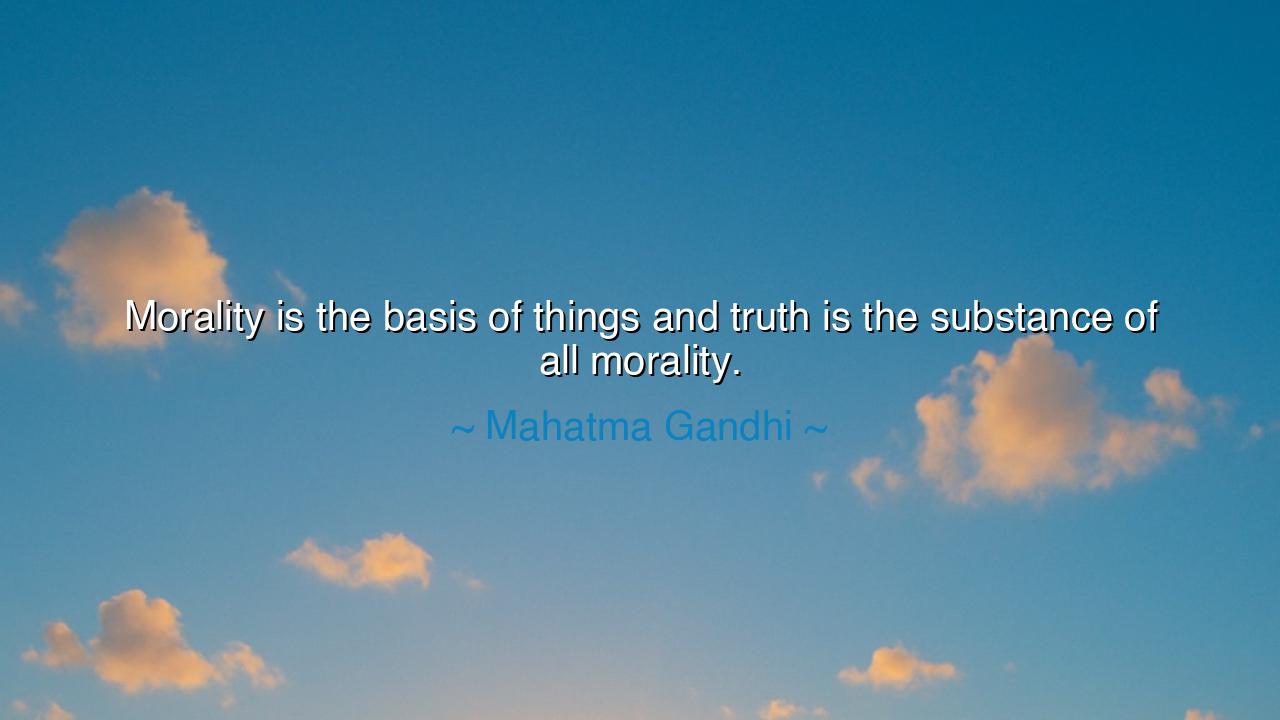
Morality is the basis of things and truth is the substance of






Hear the timeless words of Mahatma Gandhi, the saint of peace and the warrior of justice: “Morality is the basis of things and truth is the substance of all morality.” In this utterance shines the distilled essence of his life’s teaching. He proclaims that no society, no nation, no soul can stand upon greed or violence, but only upon the firm ground of morality. And deeper still, he reveals that the very heart of morality is truth—that living alignment with what is real, eternal, and just. Without truth, morality is hollow, a mask without substance. With truth, morality becomes the root from which all noble deeds grow.
The origin of this wisdom is found in Gandhi’s own spiritual quest. From his earliest days, he was shaped by the teachings of the Bhagavad Gita, the Sermon on the Mount, and the lives of saints and prophets. He saw that men quarreled endlessly about doctrines, but that all true faiths converged upon the same foundation: that human life must be rooted in morality, and that the soul’s highest duty is fidelity to truth. This conviction became his guiding star, leading him through the struggles of South Africa and the liberation of India.
Consider the great movement of nonviolence that Gandhi forged. Many thought only weapons could break the chains of empire, but Gandhi held that moral strength was greater than all armies. He called his people to resist, not with hatred, but with truth—what he named satyagraha, the force of truth. And because his resistance was rooted in morality, it could not be corrupted by cruelty or despair. His triumph proved to the world that truth is not weakness but the very substance of justice, and that when morality leads, nations can be reborn.
History itself confirms his words. Think of Abraham Lincoln, who stood firm in declaring that a house divided by slavery could not stand. His politics were not mere strategy but an expression of moral conviction. And what gave that morality power? The truth—the self-evident truth that all men are created equal. Without that truth, morality would have been sentiment alone; with it, his morality became a pillar strong enough to weather civil war and bring forth freedom for millions.
The lesson of Gandhi’s saying is this: morality is not optional, nor is it a luxury for peaceful times. It is the very basis of human life. A man without morality becomes a beast; a nation without morality collapses into tyranny. But morality cannot stand alone—it must drink from the well of truth. Rules, customs, traditions—these may appear moral, but if they are not rooted in truth, they are false garments, soon to be torn away. Only truth gives morality weight, substance, and enduring strength.
O children of tomorrow, hear this and take it into your lives: seek always for the truth, even when it unsettles you, even when it demands sacrifice. Let your morality be built not on convenience or on the shifting sands of opinion, but on what is true and eternal. Speak honestly, act justly, live humbly, and let your heart be ever guided by truth. For when truth dwells in your morality, your steps will be firm, your spirit will be unshaken, and your influence will echo far beyond your own days.
Therefore, let your daily practice be thus: before every decision, ask—Is this moral? And deeper still, ask—Is this moral because it rests upon truth? If you find truth at its root, walk boldly forward, for your path will be blessed. If you do not, pause, reflect, and seek again. For in the end, as Gandhi proclaimed, all morality is but the garment of truth, and all life flourishes only when wrapped in that eternal fabric.
Thus remember Gandhi’s wisdom: “Morality is the basis of things and truth is the substance of all morality.” Live by it, and you will not merely exist, but stand as a beacon to others, proving by your life that truth and morality are the twin pillars upon which all that is good and lasting must be built.






GDGold D.dragon
Gandhi’s quote highlights the importance of truth in shaping our moral compass. It’s easy to think that morality is subjective, based on societal norms or personal beliefs. But if truth is the substance of morality, does this mean there’s an objective foundation for what is right and wrong? How do we find that truth in our complex, fast-changing world, where moral standards seem to constantly evolve?
CVLe chi vi
I like the idea that morality is grounded in truth, but it makes me wonder—what happens when the truth is difficult to define? If morality is built on truth, does that mean moral actions are also uncertain when we don’t have a clear understanding of what’s true? How do we navigate moral dilemmas when the truth is unclear or when we’re faced with competing truths from different perspectives?
TP25- Luong Ngoc Thuy Phuong
I really appreciate Gandhi’s view that truth is at the heart of morality. It suggests that without truth, our moral actions lose their meaning. But can we always know the truth? Are there situations where what we believe to be the truth could actually be flawed, and how does that impact our sense of right and wrong? Should we always question our own truths to ensure our morality is rooted in reality?
VHDang viet Hung
This quote really makes me think about the relationship between morality and truth. Gandhi is suggesting that morality cannot stand without truth as its foundation. But what happens when different people have different perceptions of what’s true? Does this mean that moral values can vary, depending on the truth people believe in? How do we reconcile conflicting truths when it comes to morality, especially in a diverse world?